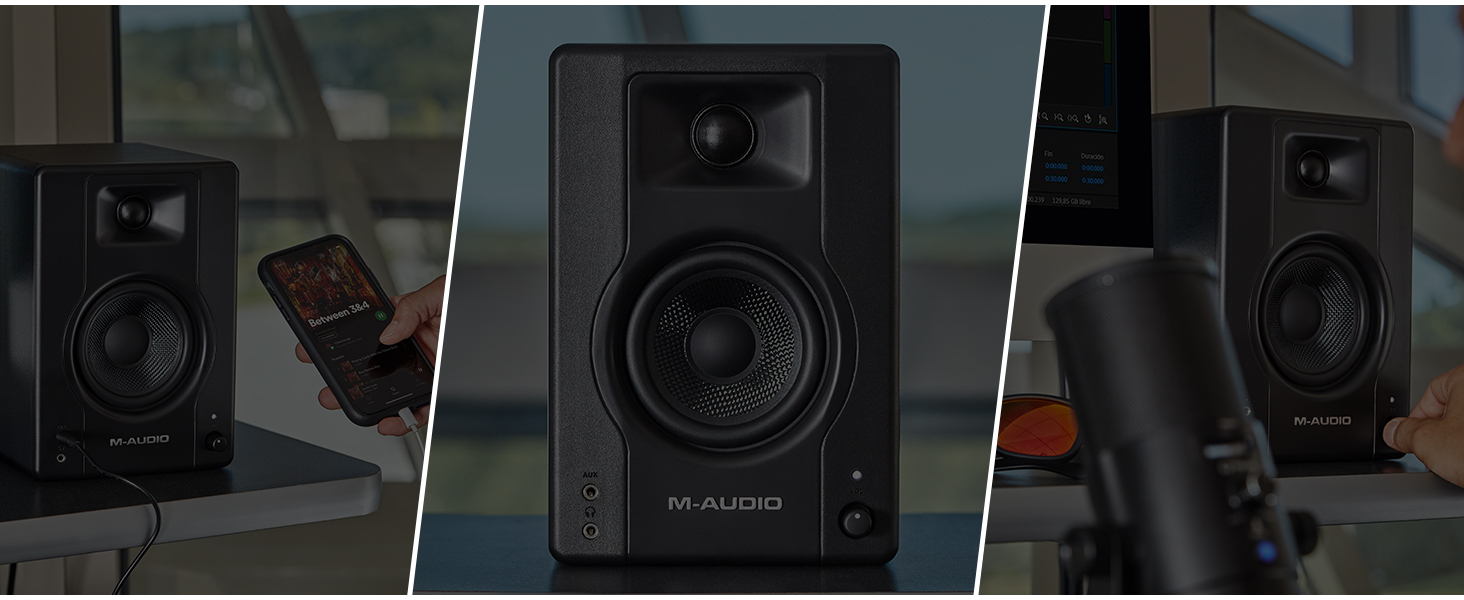Top Picks for best studio monitors for podcasting
1. PreSonus Eris 3.5 Studio Monitors
The PreSonus Eris 3.5 is one of the most popular choices among beginner and intermediate podcasters. Compact yet powerful, these monitors deliver studio-quality sound with versatile connectivity.
Pros:
-
Accurate, balanced sound with tight bass
-
Multiple input options (TRS, RCA, Aux)
-
Customizable tuning controls for different rooms
-
Convenient headphone output
Cons:
-
Bass may feel limited without a subwoofer
-
Not ideal for large studio spaces
2. Mackie CR3.5 3.5" Creative Reference
The Mackie CR3.5 combines studio-quality sound with user-friendly features, making it a flexible choice for podcasters, gamers, and casual listeners.
Pros:
-
Tone knob for easy sound adjustment
-
Location switch for desktop or bookshelf use
-
Clean, articulate sound with silk dome tweeters
-
Budget-friendly with solid build quality
Cons:
-
Bass response not as deep as larger monitors
-
Works best in small studio setups
3. M-Audio BX3 Pair 3.5" 120W Studio Monitors
The M-Audio BX3 is designed for podcasting, streaming, and multimedia production. With 120 watts of power, it offers immersive sound and precise imaging.
Pros:
-
High output power with deep, rich sound
-
Kevlar woofers and silk dome tweeters for accuracy
-
EQ controls for fine-tuning audio
-
Multiple connection options (TRS, RCA, Aux)
Cons:
-
Larger footprint compared to other 3.5” monitors
-
May be too powerful for very small rooms

4. Yamaha HS3 Powered Studio Monitor
The Yamaha HS3 is a compact version of Yamaha’s legendary HS series, known for delivering exceptional accuracy in audio monitoring.
Pros:
-
Excellent frequency response (70 Hz – 22 kHz)
-
Room control and high trim settings for flexibility
-
Premium build quality and sleek design
-
Trusted brand in professional audio
Cons:
-
Slightly more expensive than other entry-level monitors
-
Bass may require a subwoofer for full range
5. PreSonus Eris E5 2-Way 5.25" Near Field Studio Monitor
For those seeking an upgrade, the PreSonus Eris E5 offers more power and precision. It’s ideal for podcasters who also handle music production or advanced editing.
Pros:
-
80W Class AB bi-amplification with plenty of headroom
-
5.25” woofer for improved low-end performance
-
Acoustic tuning controls for custom setups
-
Includes Studio One Prime and plug-in suite
Cons:
-
Larger size may not fit compact desks
-
Higher price compared to entry-level monitors
Why Choosing the Right best studio monitors for podcasting Matters
When producing a podcast, sound clarity can make or break the listening experience. Using the best studio monitors for podcasting ensures that your recordings translate accurately across headphones, laptops, and car speakers. Unlike regular speakers that often boost bass or treble, studio monitors deliver a flat response, allowing you to identify and fix audio imperfections.
For anyone aiming to build a loyal audience, investing in the best premium best studio monitors for podcasting can elevate production value, making your podcast sound professional and polished.
Buying Guide for best studio monitors for podcasting
Key Features to Look For
When comparing the best studio monitors for podcasting review, check for frequency response, connectivity, size, and tuning controls. Compact monitors like the PreSonus Eris 3.5 Studio Monitors are great for beginners, while larger models like the PreSonus Eris E5 2-Way 5.25" Near Field Studio Monitor offer more depth.
Performance & Sound Accuracy
Accuracy is key. The top rated monitors such as M-Audio BX3 Pair 3.5" 120W Studio Monitors and Yamaha HS3 Powered Studio Monitor are designed to reproduce sound faithfully without coloration, ensuring that every voice recording and mix comes through naturally.

Price & Value
From the best budget options like Mackie CR3.5 3.5" Creative Reference to higher-end models, there are solutions for every budget. Beginners can start with affordable monitors, while professionals may invest in higher-end models for long-term reliability.
Brand Reputation
Trusted brands like PreSonus, Yamaha, Mackie, and M-Audio have a proven track record in audio production. Choosing from these reputable manufacturers ensures durability, consistent performance, and better customer support.
Expert & User Reviews
Reading both expert and user feedback helps balance technical insights with real-world experience. Many reviews highlight PreSonus Eris for versatility and Yamaha HS series for accuracy.
FAQs about best studio monitors for podcasting
What is the best best studio monitors for podcasting in 2025?
The PreSonus Eris 3.5 Studio Monitors remain one of the top-rated models in 2025 thanks to their affordability, sound accuracy, and versatility. For professionals, the Yamaha HS3 Powered Studio Monitor and PreSonus Eris E5 are excellent upgrades.
How to choose the right best studio monitors for podcasting?
Consider your recording space, budget, and workflow. Small rooms benefit from compact monitors like the Mackie CR3.5, while larger studios can make use of more powerful options such as the M-Audio BX3.

Are best studio monitors for podcasting worth it?
Yes, investing in the best studio monitors for podcasting ensures accurate editing and professional-quality sound. Unlike regular speakers, they reveal imperfections and help create a consistent audio experience for listeners.
Which brands are most trusted for best studio monitors for podcasting?
Trusted names include PreSonus, Yamaha, Mackie, and M-Audio, all known for producing reliable and high-quality studio monitors widely used in podcasting and music production.
Final Thought
Choosing the best studio monitors for podcasting is an investment in your show’s quality. From budget-friendly models like the Mackie CR3.5 to professional options such as the Yamaha HS3 and PreSonus Eris E5, there’s a perfect fit for every podcaster. By focusing on accuracy, reliability, and value, you can ensure that your podcast stands out with clear, professional sound.















